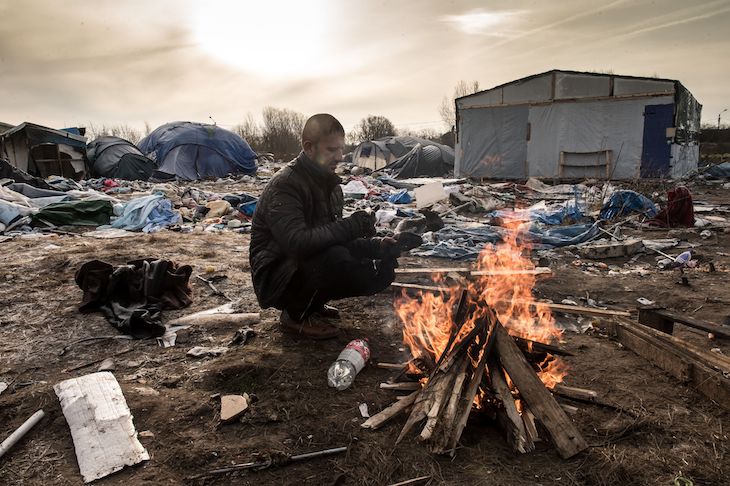Last week Nigel Farage described the deal we’ve done with France over the refugee camp near Calais as a ‘humiliating capitulation’. His was the most disgruntled voice among a number of others. The disgruntlement arose from the ‘Sandhurst’ deal struck with France during President Macron’s visit to Britain. The Prime Minister had agreed (at Sandhurst) to pay some £44.5 million more for the maintenance of security on French soil, mostly around Calais, and undertaken to speed up the snail’s-pace processing of applications from refugees with family connections in Britain.
This is the price we paid for France continuing with the ‘juxtaposed’ joint border controls our two countries maintain on each other’s soil: an idea established by the Sangatte agreement between John Major’s government and its French counterpart in 1991 and the Le Touquet accord which Tony Blair struck in 2003, extending cooperation on Eurostar rail services to ferry-port services too. It was a very fair price indeed. France has gone the extra mile for us at Calais. We ought to be more grateful.
Whenever conflicts of interest with France arise, we English have a reflexive tendency to assume that the French are trying to do us down. This is sometimes true. But the background rumble of resentment over French demands for Calais strikes me as unreasonable. We hear little acknowledgement that for many years now France has behaved with extraordinary tolerance — even generosity — towards her English neighbours over the migrant camps we effectively impose on Calais and its surrounds.
Ask yourself how we would feel if the situation were reversed. Imagine that a whole corner of Kent had to live with the blight of migrant camps, security fences and the mess and disorder that arises from trying to maintain and control them. Local residents in Dover and Folkestone and their representatives in government would see this as an outrage, and so it would be. The news media (picture the Daily Mail) would be awash with stories of squalor and filth, and reports that local residents were — or felt — intimidated. We would feel that because France was the desired destination of these migrants, France was causing the mess and the French should sort it out. I find it hard to imagine we would put up with such a disgraceful situation for long. The French have been putting up with it for years.
Despite the name Sangatte attaching to the 1991 agreement, there was no refugee camp near Calais then, and none was anticipated or France would almost certainly not have given us the right to stop would-be immigrants who were still on French soil. I’ve trawled the archives and can find not a single worry expressed about future migrants. At the time, the deal over border posts was associated not with asylum applications but with the opening of the exciting new rail tunnel. ‘Nearer to France,’ trilled the Times leader, ‘Let us marvel at the Channel Tunnel.’ ‘No longer an island,’ said a Telegraph editorial, rather less sure this was a good thing. Nobody expected the asylum seekers.
In recent years our two countries have faced an entirely changed situation. A number of myths have arisen about its causes, all of them flattering to Britain. The first is that asylum seekers all want to come here, and not France, because we are so much more attractive as a destination. In fact, in 2016 some 85,000 people sought asylum in France and 30,000 in Britain. Figures published last week showed there were more than 100,000 applications for asylum in France in 2017 while the most recent figures for the UK reveal 26,617 applications in the year ending September 2017. In short, most asylum seekers who reach France do so with the intention of applying for asylum in France. Many of them do so successfully: the second myth being that it’s easier to win asylum in Britain than in France. In fact, both countries reject about two-thirds of applicants in the first instance, and then accept a modest proportion more on appeal.
The third myth is that Britain is kinder than France to asylum seekers. In fact benefits and allowances look a bit more generous in France, though the right to seek work sooner in France than Britain is probably counteracted by the fact that, because we do not have identity cards, the British state seems incapable of tracing illegal workers.
The numbers at Calais (which are actually considerably down at present) only look grotesque because there’s been such a concentration in one small patch of France. That small patch has been remarkably forbearing, but is close to the end of its tether.
Were France’s patience to snap, its government would be well within its rights to abrogate the treaties of Sangatte and Le Touquet on the grounds that the present situation was never contemplated when the deals were made. The French would lose comparatively little from returning to the status quo ante: French visitors to Britain would face the inconvenience of border checks on each side of the channel or at both railway termini. British visitors to France would suffer a reciprocal inconvenience, as do visitors to and from (say) the United States.
But this would be the difference: we British would quickly get a migrant camp in Kent. This is because asylum seekers would not be stopped until they reached our shores, and having lodged their request for asylum, they could not be returned to France. There is no flow of asylum seekers through Britain en route to the Continent, so there would be no corresponding camp at Calais.
So Theresa May was in a weak position in Sandhurst — and got off lightly. I would not go so far as to claim that the French have been altruistic on this issue, but it’s clear that warm relations with Britain are important to them for many reasons. So no, Mr Farage, this was no capitulation; and if anyone here is giving ground, it is the French. They needn’t put up with this — but they do.
Got something to add? Join the discussion and comment below.
Get 10 issues for just $10
Subscribe to The Spectator Australia today for the next 10 magazine issues, plus full online access, for just $10.
You might disagree with half of it, but you’ll enjoy reading all of it. Try your first month for free, then just $2 a week for the remainder of your first year.















Comments
Don't miss out
Join the conversation with other Spectator Australia readers. Subscribe to leave a comment.
SUBSCRIBEAlready a subscriber? Log in